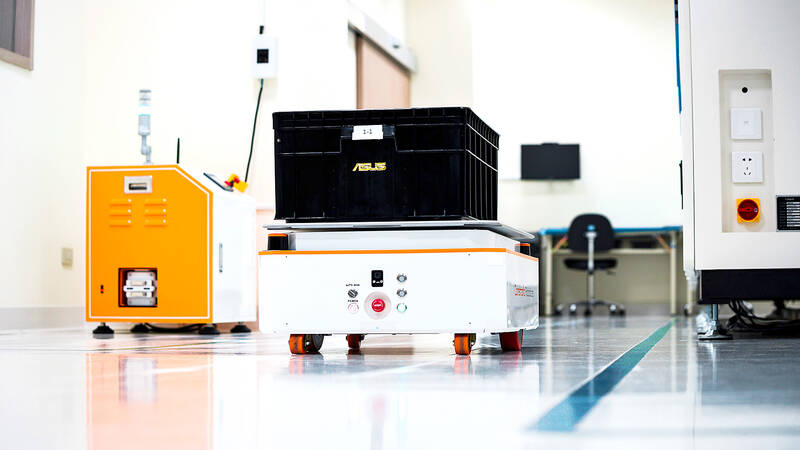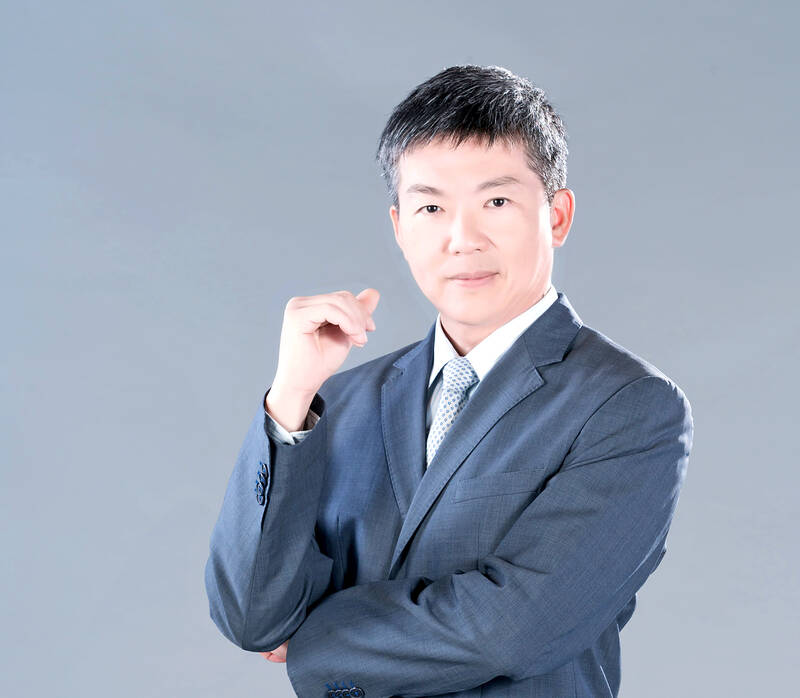Intel Corp’s exit of next-unit-of-computing (NUC) provides a boon for Asustek Computer Inc (華碩) to expand its mini-PC business at a faster pace than the segment’s average of 10 to 20 percent a year, as the world’s PC sales are dwindling during the post-COVID-19 pandemic era.
Asustek set the internal growth target after officially taking over Intel’s NUC product lines last week, making the palm-sized PCs one of the new growth drivers alongside the company’s new server and commercial computer businesses.
With the new NUC business unit, the PC vendor is seeking to gain a stronger foothold in the inconspicuous segment of industrial computers by integrating Intel’s popular NUCs with its existing mini-PC series.

Photo courtesy of Asustek Computer Inc
When it comes to PCs, most people think of consumer and commercial computers, while overlooking industrial or embedded computers, Jackie Hsu (許祐嘉), co-head of Asustek’s Open Platform Business Group and AIoT Business Group, said in an exclusive interview with the Taipei Times on Tuesday at Asustek’s headquarters in Taipei’s Beitou District (北投).
Industrial computers enjoyed a decent and stable growth rate of a double-digit percentage annually over the past few years in terms of unit shipments, outpacing traditional PCs, Hsu said.
Global PC shipments are expected to contract 13.7 percent to 252 million units this year as demand plummeted from the booms created by remote work and school demand due to the COVID-19 pandemic, according to IDC’s forecast.

Photo courtesy of Asustek Computer Inc
With wider coverage from industrial computers, commercial and gaming computers, mini-PCs registered robust growth of 10 to 15 percent a year over the past few years, Hsu said.
It would be a reasonable target for Asustek to outgrow the overall mini-PC segment, Hsu said.
Hsu is a member of a cross-division task force created to discuss the takeover of Intel’s NUC business intensively with their Intel counterparts, prior to the US chip giant’s announcement in July that it would stop providing direct investment for the palm-sized PC lines. He oversees the new NUC business unit jointly with another Asustek executive.
“We are very optimistic about it,” Hsu said. “We received positive feedback from our clients from the US, Europe and Asia, indicating the market also shows similar optimism.”
Mini-PCs are a relatively stable segment and less vulnerable to market changes than traditional PCs, as corporations tend to continue investing in machines that help improve operational efficiency to boost earnings during market upturns and downturns, Hsu said.
Since Intel launched the first NUCs a decade ago, mini-PCs have gained popularity among technology professionals and business users, given the flexibility of adding their own memory, storage and operating system similar to DIY kits. Intel has shipped about 10 million units of NUC products since then.
“With the inclusion of Intel’s NUCs, Asustek will have the most comprehensive offerings among companies with similar products. That gives us a competitive edge,” Hsu said.
The Taiwanese PC vendor inked an agreement on Monday to obtain the right to design, manufacture and sell Intel’s 10th through 13th-generation NUC product lines. A high percentage of Intel’s NUC engineers also transferred to Asustek, bringing the company’s NUC headcount to about 160, Asustek said.
Asustek is slated to launch the first Asus NUC in January.
However, Asustek is not in a rush to roll out Republic of Gamers-branded (ROG) NUCs due to time constraints, the company said.
ROG is Asustek’s gaming-related products brand. It requires a longer period of product design to meet a series of requirements and criteria specially designed for ROG-brand products, Hsu said.
Asustek has an ROG committee to review any new products that intend to carry the brand, Hsu said, adding that the rules have been in place for more than 10 years.
The ROG committee is formed by people from different units of the company, he said.
The company targets four major vertical industries — smart manufacturing, healthcare, retail and smart city infrastructure — to develop the new Asus NUC series.

With an approval rating of just two percent, Peruvian President Dina Boluarte might be the world’s most unpopular leader, according to pollsters. Protests greeted her rise to power 29 months ago, and have marked her entire term — joined by assorted scandals, investigations, controversies and a surge in gang violence. The 63-year-old is the target of a dozen probes, including for her alleged failure to declare gifts of luxury jewels and watches, a scandal inevitably dubbed “Rolexgate.” She is also under the microscope for a two-week undeclared absence for nose surgery — which she insists was medical, not cosmetic — and is

CAUTIOUS RECOVERY: While the manufacturing sector returned to growth amid the US-China trade truce, firms remain wary as uncertainty clouds the outlook, the CIER said The local manufacturing sector returned to expansion last month, as the official purchasing managers’ index (PMI) rose 2.1 points to 51.0, driven by a temporary easing in US-China trade tensions, the Chung-Hua Institution for Economic Research (CIER, 中華經濟研究院) said yesterday. The PMI gauges the health of the manufacturing industry, with readings above 50 indicating expansion and those below 50 signaling contraction. “Firms are not as pessimistic as they were in April, but they remain far from optimistic,” CIER president Lien Hsien-ming (連賢明) said at a news conference. The full impact of US tariff decisions is unlikely to become clear until later this month

GROWING CONCERN: Some senior Trump administration officials opposed the UAE expansion over fears that another TSMC project could jeopardize its US investment Taiwan Semiconductor Manufacturing Co (TSMC, 台積電) is evaluating building an advanced production facility in the United Arab Emirates (UAE) and has discussed the possibility with officials in US President Donald Trump’s administration, people familiar with the matter said, in a potentially major bet on the Middle East that would only come to fruition with Washington’s approval. The company has had multiple meetings in the past few months with US Special Envoy to the Middle East Steve Witkoff and officials from MGX, an influential investment vehicle overseen by the UAE president’s brother, the people said. The conversations are a continuation of talks that

CHIP DUTIES: TSMC said it voiced its concerns to Washington about tariffs, telling the US commerce department that it wants ‘fair treatment’ to protect its competitiveness Taiwan Semiconductor Manufacturing Co (TSMC, 台積電) yesterday reiterated robust business prospects for this year as strong artificial intelligence (AI) chip demand from Nvidia Corp and other customers would absorb the impacts of US tariffs. “The impact of tariffs would be indirect, as the custom tax is the importers’ responsibility, not the exporters,” TSMC chairman and chief executive officer C.C. Wei (魏哲家) said at the chipmaker’s annual shareholders’ meeting in Hsinchu City. TSMC’s business could be affected if people become reluctant to buy electronics due to inflated prices, Wei said. In addition, the chipmaker has voiced its concern to the US Department of Commerce